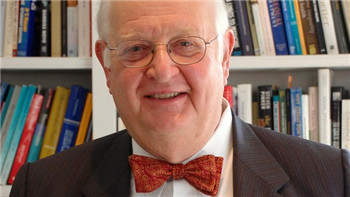(单词翻译:单击)

Angus Deaton, a British-born economist at Princeton University in the US, has won the Nobel Prize for economics for his pioneering work into what determines poverty and how people make their consumption decisions.
出生于英国、现在任职于美国普林斯顿大学(Princeton University)的经济学家安格斯迪顿(Angus Deaton)因为开创性的研究工作而获得诺贝尔经济学奖,他的研究揭示了哪些因素决定贫困,以及人们如何作出自己的消费决策。
The Royal Swedish Academy of Sciences said Mr Deaton was awarded the prize “for his analysis on consumption, poverty and welfare”.
瑞典皇家科学院(Royal Swedish Academy of Sciences)表示,迪顿被授予该奖是因为他“对消费、贫困和福利的分析”。
“[His research] shows an impressive breadth in its approaches: basic theory; statistical methods for testing theories; in-depth knowledge of the quality of existing data; and extensive work on producing new kinds of data.”
“(他的研究)在方法上展示了令人印象深刻的广度:基本理论;用于测试理论的统计方法;对现有数据质量的深入把握;以及在产生新类型数据上的大量工作。”
A dual US and British citizen, Mr Deaton is the first native Briton to win the Nobel Prize in economics since Clive Granger in 2003. He joins a select list of academics who have won the SKr8m ($980,000) prize solo.
拥有美英双重国籍的迪顿,是自2003年克莱夫格兰杰(Clive Granger)赢得诺贝尔经济学奖以来首位获得这一殊荣的英裔学者。他成为少数独享800万瑞典克朗(合98万美元)奖金的学者之一。
Mr Deaton’s work has employed innovative statistical techniques to understand what drives people’s shopping habits and how governments can better foster economic development.
迪顿在研究中采用了创新的统计方法,以求理解哪些因素驱动着人们的购物习惯,政府如何更好地促进经济发展。
He has spearheaded the use of more precise microeconomic data to understand what happens in an economy as a whole, questioning well-known assumptions and helping to solve apparent paradoxes on the relation between consumption and income.
他率先利用更精确的微观经济数据探究经济体作为一个整体在发生什么,在此过程中质疑著名的假设,并帮助解决消费和收入之间貌似存在的矛盾。
“Natural scientists are often sniffy [about the Nobel Prize in economics] as they don’t regard it as scientific,” said John Muellbauer, an economist at Oxford university who has worked with Mr Deaton. “This is an exception, it is evidence-based economics of the highest standard.”
“自然科学家往往对(诺贝尔经济学奖)嗤之以鼻,不承认经济学也是科学。”牛津大学(Oxford university)经济学家、曾与迪顿共事的约翰猠尔鲍尔(John Muellbauer)表示,“这是一个例外,它是最高标准的循证经济学。”
For example, together with Mr Muellbauer, Mr Deaton compiled a system of equations to understand how consumer decisions regarding different goods interacted. This is essential for governments planning to make policy changes such as cutting value added tax for some products, as such decisions have varying effects on different groups of consumers depending on what they buy.
例如,迪顿曾与米尔鲍尔一起编写了一个方程组,试图描述消费者对于不同商品的决策是如何互动的。对于正在酝酿政策变化(比如降低针对某些产品的增值税)的政府,这种理解是不可或缺的,因为此类决策对不同的消费者群体会产生不同的影响——取决于他们购买什么。
He built on work looking at the link between consumption and income by fellow Nobel laureates Franco Modigliani and Milton Friedman to understand how changes in income drive changes in consumption. He warned against using aggregate data for the whole economy to justify important policy decisions and showed how it is essential to understand what happens to different groups of consumers, depending on their age or income levels.
他进一步发展了诺贝尔奖得主佛朗哥莫迪利亚尼(Franco Modigliani)和米尔顿弗里德曼(Milton Friedman)对于消费和收入之间联系的研究,以求理解收入变化如何驱动消费变化。他警告不要使用整个经济的汇总数据为重要决策提供依据,并且证明,了解不同消费者群体的具体情况(取决于他们的年龄或收入水平)是至关重要的。
Orazio Attanasio, an economist at University College London, said: “Angus Deaton is one of the few people who understands consumption behaviour deeply, both across individuals and over time.”
伦敦大学学院(University College London)经济学家奥拉齐奥阿塔纳西奥(Orazio Attanasio)表示:“安格斯迪顿是深刻理解消费行为的极少数人之一,他对消费行为的理解不仅涵盖广大个体,还涵盖时间维度。”
Mr Deaton advocated the importance of building extensive data sets on consumption patterns to understand the determinants of poverty. Contrary to what was previously assumed, he showed that increasing people’s income leads to a better food intake. As a result, there was little empirical reason to orient aid programmes only towards food as opposed to economy growth, as some agencies had recommended.
迪顿主张构建广泛的消费模式数据集,据此理解贫困的决定因素,他认为这很有必要。与以往的假设相反,他展示了提高人们的收入会带来更好的食物摄入。这意味着,没有什么实证理由支持某些机构的建议,即援助计划应当专注于提供食物,而非促进经济增长。


